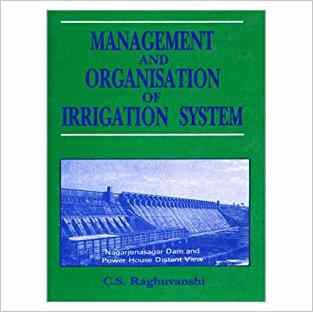Only logged in customers who have purchased this product may leave a review.
Sale!
Management and Organisation of Irrigation System (Hardcover) | Released: 1995
By: C.S. Raghuvanshi (Author) Publisher: Atlantic33.00% Off Original price was: ₹795.00.₹533.00Current price is: ₹533.00.
You save ₹262.00
Water is one of the essential resources in agricultural production, which has several unique characteristics. Individual farmers, acting alone, can seldom acquire water for irrigation. Construction and maintenance of the physical structures to divert, convey, and distribute water usually require huge investments, which is beyond the capacity of a farmer... Read More
In stock
Ships within 1-2 Business Days

100% Orginal Books

Easy Replacement

Certified product

Secure Checkout

On time delivery
Author:
![]()
C.S. Raghuvanshi
Publisher Name:
![]()
Atlantic
Language:
![]()
English
Binding:
![]()
(Hardcover)
About The Book
Water is one of the essential resources in agricultural production, which has several unique characteristics. Individual farmers, acting alone, can seldom acquire water for irrigation. Construction and maintenance of the physical structures to divert, convey, and distribute water usually require huge investments, which is beyond the capacity of a farmer Surface water cannot be easily stored and particularly by the individual farmer, as fertilisers, pesticides etc. can be. Water must be used whenever it is available. However, farmers generally cannot transport water economically over great distances and the locations. All irrigation systems require that certain essential tasks should be accomplished, if the system is to function productively, for which three sets of management activities become essential.
For an efficient management of irrigation projects, the role of organisation, channels of communications, patterns of influence, lines of authority and loyalty, which can ensure some sort of efficiency, equity and social justice, cannot be overemphasized. This necessitates that irrigation management must devote a large part of its attention to its organisation.
This noble objective can be achieved through an interdisciplinary approach to the management and organisation, water distribution, cropping pattern, complementary inputs, land reforms, fanners' participation, pricing of water and energy, economic and financial evaluation, institutional needs, command area development etc. This could be possible through the structuring of individuals and functions into productive relationships in an organisation. This book addresses to this crucial but neglected element in the equation of efficient irrigation management. It starts from the premise that irrigation management is best regarded as a socio-technical enterprise, where the human dimension interacts with the physical and technical ones. The book thus covers a series of organizational variables and human behaviour backed with critical inputs, institutional needs and services.
Table of Contents: 1. Management: Its Meaning and Scope, Purpose - Elements of Management, Distinction between Management and Organisation, Types of Organisation in Irrigation System: Principles of Organisation, Structure, Organisations, as Social Systems, Managerial Roles in a Social System, Organisational Needs in Irrigation Management: Motivation, Aspiration, Productivity and Morale, Human Skill Development, Socio-psychological Concepts, Farmers' Behaviour, Perception, Values, Attitude and Economic and Social Institutions.
2. Farmers Participation in Overall Planning and Management of Irrigation System, Irrigation Management Activities, 'On-Farm Development Works', Organising Farmers, Farmers' Involvement, The Concept of Participation - Experience of Some Selected Projects viz. Mohini Cooperative Irrigation Society, Sukhomajri, Ralegan Siddhi, Aga Khan Rural Support Programme, Krishna Theera Raitha Sangh etc., Theory of People's Participation, Possibilities of Forming Alternative Organisations, Participatory Management.
3. Distribution Net Work, Methods of Water Distribution Rotational and Simultaneous, Distribution on Demand, Rotational Delivery System, Water Allowance, Water Supply/Distribution Systems, Principles of Warabandi System, Management of a Water Course, Malpractices in the Management of Water Course, Performance and Appropriateness of the Present Irrigation Systems to Improve Productivity, Water Distribution Practices - Present Policies : Demand-based and Holding-based.
4. Cropping Pattern and Crop Planning: Physical, Economic and Social Factors and their Role in
Determining Cropping Pattern, Cropping Pattern Zones, Factors affecting Cropping Patterns and Rotations, Influence of Soils and Climate, Farmers Choice of Cropping Pattern, Water Production Functions, Crop Planning.
5. Diagnostic Analysis A Tool for Irrigation Management, Concept of Diagnostic Analysis, Objectives of the Diagnostic Analysis, Revised Objectives and Plans, Detailed Studies, Inter- Disciplinary Analysis and Synthesis, Report Writing Performance Indicators Irrigation System, Agricultural System, Economic, Social and Environmental.
6. Command Area Development Programme Objectives, Achievements, Constraints, Weaknesses, Future Strategy for Improvement and Organisational Set-up.
7. Designing Water Users' Association Structure of Association, Functions and Powers, Organising Farmers, Special Organisation for small and Marginal Farmers, Training and Extension, Farmers' Training.
8. Institutional Needs for Conservation of Water Priority Claims for Different Uses, Water Resources Management, Wastage of Water, Possibilities of Altarnate Institutions for Water Conservation, Training of Consumers, Farmers and Administrative Staff.
9. Feasibility Study - Feasibility Tests, Needs for Economic Feasibility Test, Steps in Feasibility Study.
10. Mathematics of Finance - Choice of a Discount Rate, Project Costs and Benefits, Measures of Present Worth, Present World Method, Benefits - Cost Ratio, Internal Rate of Return Economic Analysis.
11. Economic Evaluation of Water Resources Projects - Social Effects of the Projects, Costs and Benefits of the Project, Derivation of the Cash Flow, Farm Gate and International Prices, Financial Crop Budgets, Economic Efficiency and Financial Prices, Social Benefit Cost Analysis, Discounting Techniques, Evaluation under Uncertainty - Traditional Approach Probability and Sensitivity Analysis.
12. Financial Analysis - Sources of Funding, General Financing Methods, General Obligation Bonds, Revenue Bonds and Assessment Bonds, Debt Service Interest Rate and Repayment Period, Planning the Debt Structure.
13. Complementary Inputs - Fertiliser and Water Availability, Organisational Set up and Distribution.
14. Land Reforms and Their Significance in Equitable Distribution of Water Significance of Land Reforms in India, Impediments in Implementation, Ceilings on Land Holding: Controversy, Role of Land Reforms in Equitable Distribution of Water, Consolidation of Holdings, Small Holding, A Constraint in Efficient Use of Irrigation Water.
15. Economic Pricing of Water - Economic and Financial Criteria for Fixation of Irrigation Charges, Repayment Capacity of Beneficiaries, Willingness and Ability to Pay Criteria, Water Production Function Application, Irrigation Charges in Different States.










Reviews
There are no reviews yet.